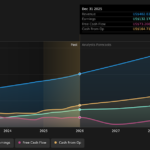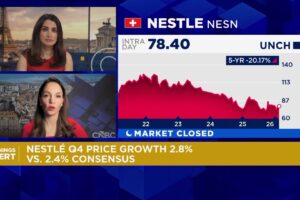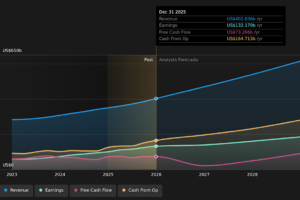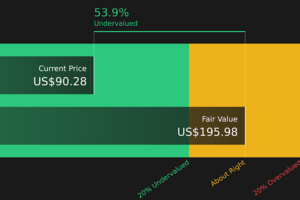
(Bloomberg) — Asian shares dropped after tech giants dragged down US stocks, with focus shifting from the Federal Reserve’s policy outlook to Nvidia Corp.’s earnings later this week.
Most Read from Bloomberg
Hong Kong and mainland Chinese markets opened lower, tracking weakness in South Korean and Australian equities. US futures slid in Asia trading after some of the world’s largest tech names pushed Wall Street down.
The declines came after a gauge of the “Magnificent Seven” megacaps dropped 1.2% Monday. While more than half of the shares in the S&P 500 gained, the US equity benchmark edged lower — a consequence of weakness in the tech giants that dominate it.
Treasuries were largely steady in Asia after the 10-year yields rose two basis points to 3.82% Monday. The dollar was flat.
Expectations heading into Nvidia’s earnings on Wednesday are high, with analysts anticipating another strong consensus beat that could prompt the chipmaker to raise its profit guidance. The results may provide further clarity on artificial intelligence demand, with Nvidia being the direct beneficiary of the intense spending by companies building out AI infrastructure.
“Move over Powell – it’s Jensen Huang’s turn to move markets,” said Anthony Saglimbene at Ameriprise, referring to Nvidia’s chief. “In our view, Nvidia’s earnings report this week may actually have more impact on the overall market than Powell’s Jackson Hole speech last week.”
Chinese consumers returned to the spotlight after PDD Holdings Inc.’s shares fell the most since 2022 in New York. A warning of slow sales by Temu’s owner was the latest disappointment from the sector, where the country’s biggest consumer companies have reported revenue misses.
The world’s second-largest economy showed some promising signs in its manufacturing sector, with industrial profits at large Chinese companies expanding 4.1% on year in July.
Also in China, the government urged Canada to immediately correct the “wrong practices” of new tariffs against the Asian nation. Canada, an export-driven economy that relies heavily on trade with the US, has been closely watching moves by the Biden administration to erect a much higher tariff wall against Chinese EVs, batteries, solar cells, steel and other products.
US inflation figures this week will likely reinforce that long-awaited rate cuts are coming soon, while a reading on consumer spending is seen indicating that the central bank has been successful at keeping the expansion intact.
Economists see the personal consumption expenditures price index excluding food and energy — the Fed’s preferred measure of underlying inflation — rising 0.2% in July for a second month. That would pull the three-month annualized rate of so-called core inflation down to 2.1%, a smidgen above the central bank’s 2% goal.
Fed Bank of San Francisco President Mary Daly said it’s appropriate to begin cutting rates, while her Richmond counterpart Thomas Barkin said he still saw upside risks for inflation, though he supported “dialing down” rates.
“Powell sealed the deal for a September cut at Jackson Hole — leaving intact our thesis for continued broadening/rotation,” said Ohsung Kwon at Bank of America Corp. “But don’t sleep on Nvidia earnings, a consistent driver of S&P returns and still a risk to markets if they disappoint.”
In corporate news, LG Electronics Inc. is considering an initial public offering for its India business, tapping a booming stock market to help hit a target of $75 billion in electronics revenue by 2030. BHP Group Ltd., the world’s biggest miner, reported full-year profit edged up 2%, in line with analyst forecasts, even as China’s property market continued to weigh on its economy and demand for iron ore.
In commodities, oil dropped following gains on Monday as Libya’s eastern government said it will halt exports. Gold slid.
Key events this week:
-
China industrial profits, Tuesday
-
Germany GDP, Tuesday
-
US Conference Board consumer confidence, Tuesday
-
Nvidia earnings, Wednesday
-
Fed’s Raphael Bostic and Christopher Waller speak, Wednesday
-
Eurozone consumer confidence, Thurrsday
-
US GDP, initial jobless claims, Thursday
-
Fed’s Raphael Bostic speaks, Thursday
-
Japan unemployment, Tokyo CPI, industrial production, retail sales, Friday
-
Eurozone CPI, unemployment, Friday
-
US personal income, spending, PCE; consumer sentiment, Friday
Some of the main moves in markets:
Stocks
-
S&P 500 futures fell 0.1% as of 10:49 a.m. Tokyo time
-
Nasdaq 100 futures fell 0.1%
-
Japan’s Topix rose 0.2%
-
Australia’s S&P/ASX 200 was little changed
-
Hong Kong’s Hang Seng fell 0.8%
-
The Shanghai Composite fell 0.2%
-
Euro Stoxx 50 futures were unchanged
Currencies
-
The Bloomberg Dollar Spot Index was little changed
-
The euro was little changed at $1.1170
-
The Japanese yen was little changed at 144.64 per dollar
-
The offshore yuan was little changed at 7.1257 per dollar
Cryptocurrencies
-
Bitcoin fell 0.6% to $63,066.34
-
Ether fell 0.2% to $2,683.64
Bonds
-
The yield on 10-year Treasuries was little changed at 3.81%
-
Japan’s 10-year yield was unchanged at 0.880%
-
Australia’s 10-year yield advanced three basis points to 3.88%
Commodities
-
West Texas Intermediate crude fell 0.5% to $77.02 a barrel
-
Spot gold fell 0.3% to $2,509.48 an ounce
This story was produced with the assistance of Bloomberg Automation.
Most Read from Bloomberg Businessweek
©2024 Bloomberg L.P.








